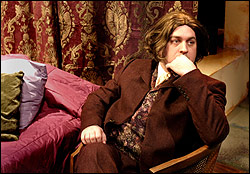The air is thick with failed accents in director Miko Premo’s staging of David Hare’s play about the fall of Oscar Wilde. Everyone attempting an English dialect in The Judas Kiss (playing through Sat., Feb. 5, at ArtsWest Playhouse; 206- 938-0339) is broadly hitting his T’s (even when there aren’t any to hit—”already” tends to come out “alreatty”). So you’ll have to make a dogged effort to cut through such overzealousness if you want to find anything of real substance—which, frankly, isn’t there as much as you’d like, despite the best of intentions.
Judas imagines Wilde (ArtsWest Director of Theater Christopher Zinovitch) and his spoiled young lover, Lord Alfred “Bosie” Douglas (John W. Bartley), at a London hotel before Oscar’s arrest for “gross indecencies” and later, in Act Two, at a crumbling Italian villa after Wilde has suffered two years of hard labor in prison. Hare has a lot on his mind here—the self-inflicted tragedy caused by Wilde’s egocentric passions, the courage behind his rebellious wit, the sacrifices anyone makes for love—and bits of it serve to stimulate a discussion of the often nasty necessity to allow people to choose their own fate.
Yet Hare gets obvious and messy, and director Premo doesn’t know how to clean him up, quiet him down, and shape something compellingly coherent. The first act, in which Wilde’s devoted friend Robert Ross (Gavin D. Cummins) and Bosie angrily debate Wilde’s options for escape, plays as a history lesson at high decibels; everybody’s yelling their opinions about the urgency of the situation, while Zinovitch flounces about in a Mary Tyler Moore wig, requesting a lobster dinner and acting too-too fabulously brave. Cummins, in the show’s best turn, gives a noble effort at conveying Ross’ crushed fidelity, but missing are any nuances in Bosie’s selfish manipulations. Bartley’s Bosie comes off as not so much a conflicted, petulant youth but a stone-cold sociopath, though it’s not entirely his fault: Hare has him berating Wilde in Italy for not proudly declaring their love, then moaning in the very next moment that what they’ve experienced was merely “a phase.” Hare seems to want Bosie to stand in for a younger, freewheeling generation of homosexuals, with Wilde serving as the preening, eclipsed old guard, but the metaphor just doesn’t stick.
As a result, Premo only successfully captures the most deliberate dramatic peaks of Wilde’s decay (although booming cheap music underscoring at such times was a very bad idea). Hare’s best moment is, not coincidentally, also the high point for both Premo and her lead actor—when Wilde bitterly, heartrendingly rails against the notion that society expected him to have learned a “moral lesson” from his cruel punishment. But what was surely Wilde’s fetid, low-level despair is nowhere in sight. When Wilde, withering away in Italy, recalls, “All I cared for was beauty,” neither Premo nor Zinovitch seems to catch the painful irony that he’s watching his beloved Bosie thoughtlessly paw at the lusty young Italian fisherman (Jason Lewing) currently serving as the lad’s main distraction. (It doesn’t help that Lewing has evidently been directed to portray a lobotomized nymphomaniac.) You could spend all night bemoaning even more blatant deficiencies, like the fact that the servants of the hotel are patently unable to make up a bed properly, or that all of the supposedly wanton sexual shenanigans occur between people who never remove their skivvies. This earnest but amateurish production lacks the searing subtleties of a love that once dared speak its name—and paid the price for it.








